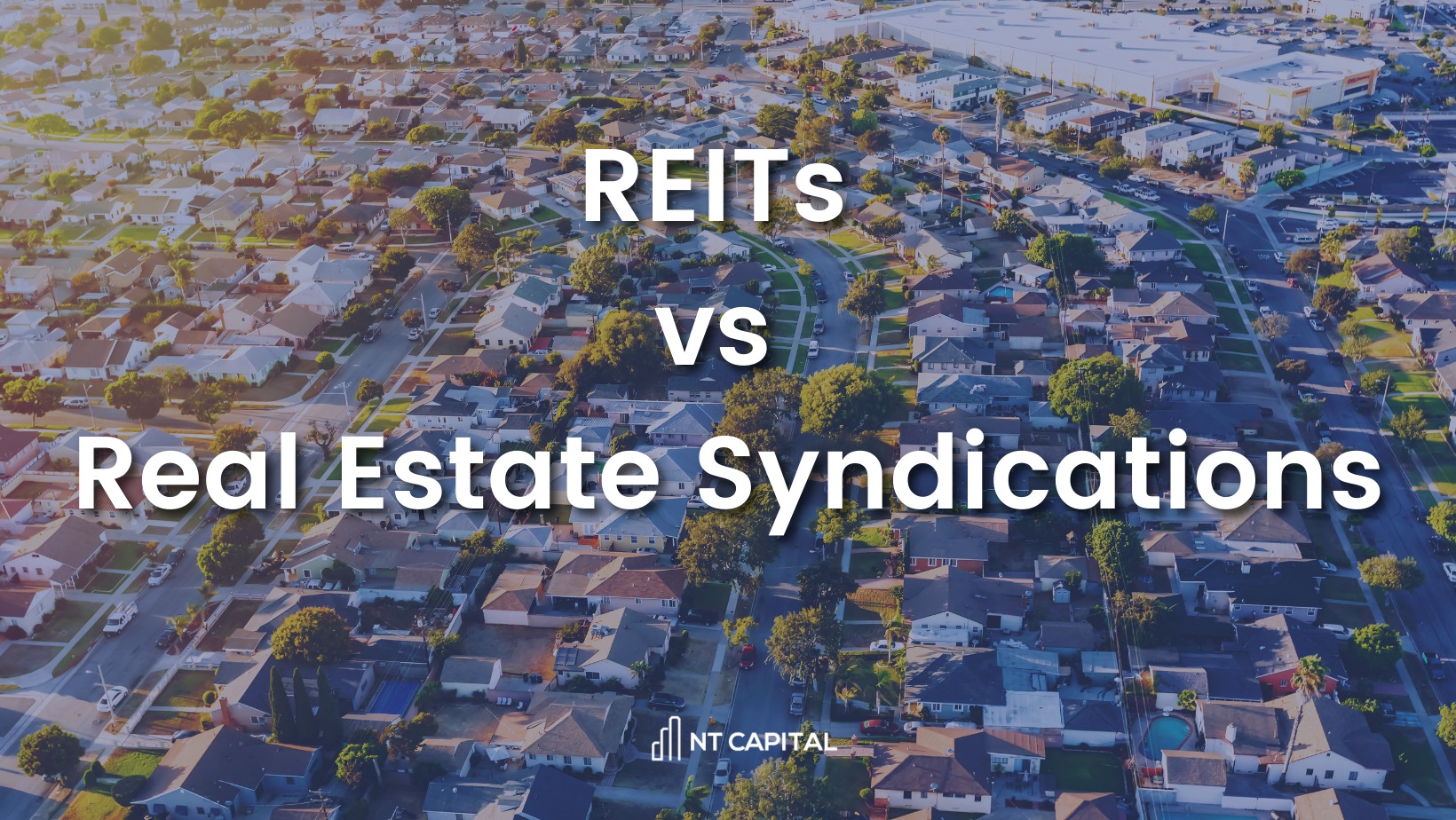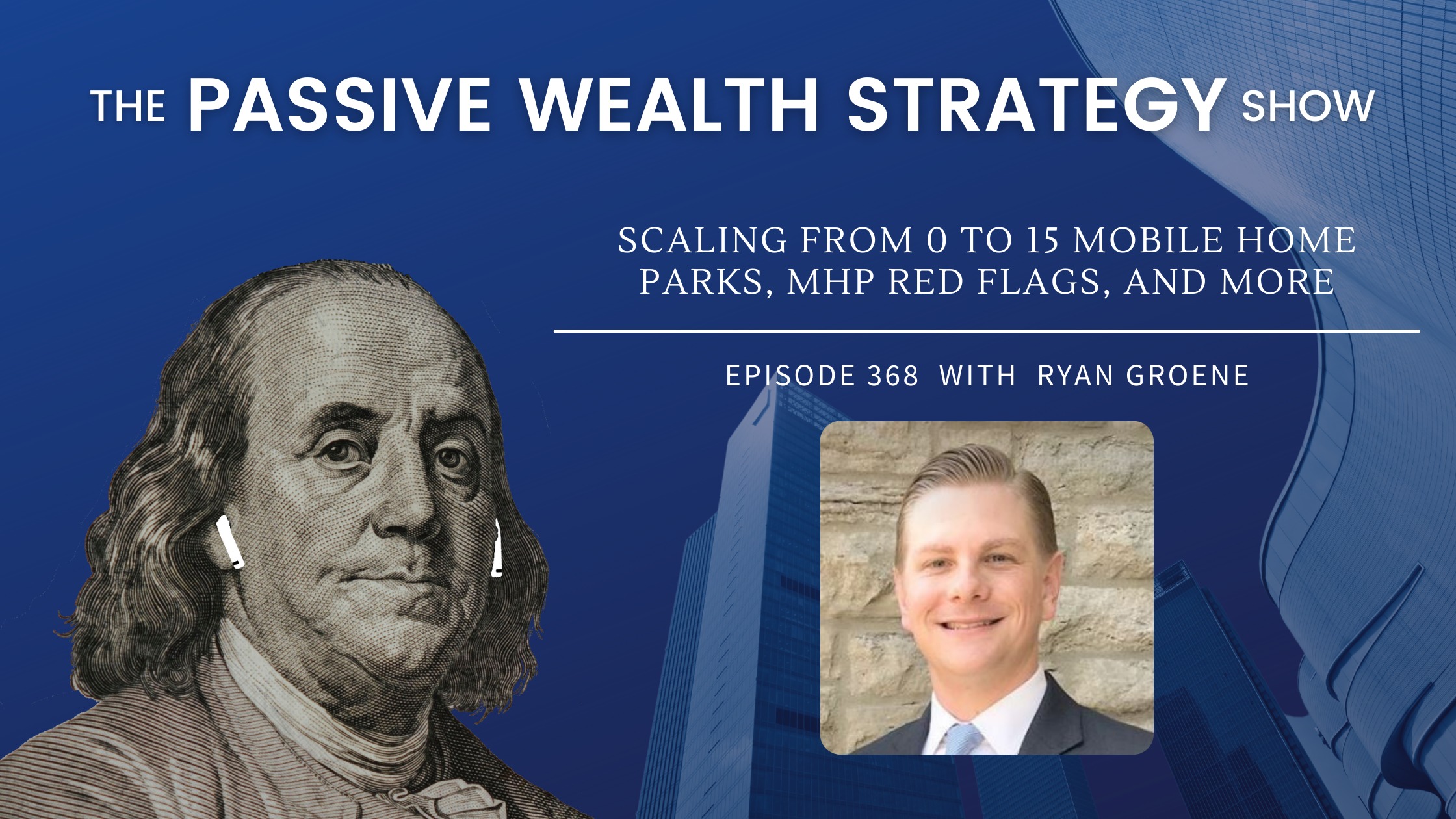
Scaling from 0 to 15 Mobile Home Parks, MHP Red Flags, and More with Ryan Groene
Ryan. Thank you for joining us today.
Of course. Yeah. Happy to be here. Taylor, you have had such an interesting experience in the mobile home parks space.
And we’re going to dig into that a bit today for our listeners out there who don’t know about you, your business, and your background. Can you tell us a bit about where you come from and what you do?
Yeah. So my background is in finance. Went I’m from Cincinnati, Ohio grew up, in the traditional, going to college, getting a job type of situation. My parents. We’re they worked pretty much for companies their whole lives. My dad is now doing the entrepreneurial thing. He works for himself, still self-employed going, so I kinda saw that growing up always subconsciously looking at different businesses, stuff like that.
Went to college, played baseball, and finances. Got out. Got my first job. We actually were talking about that before the show with selling, like I was as a financial advisor bed into my suit. Got a corporate finance job for a big five fortune 500 company and worked there for five years.
Stumbled upon mobile home parks. Just by pure chance. I looked at five car washes, laundromats, and any business under the sun that was quote-unquote passive. That everybody talks about. I had also read rich dad, poor dad in college. So it’s started flowing into my head. And then when you go to school for finance, you’re trained a little bit differently than what everybody thinks, you know about money, how money works. But you’re trained or I guess, educated in the sense that how can we make the corporation more money? How do we look at different investments from a wall street perspective? Because my then where I went to school at Miami university they trained us in the business school basically to go work on wall street from the investment banking, private equity side.
This is derived at meeting from the most making deals, massive deals happen and making fees like through the deals, basically, essentially how the investment banking work. There’s more to that, but so anyway, Double-paned, mobile home parks fell in love with the asset class for several reasons.
Took me three years to buy my first deal. And then I went full-time in 2017. I was a full-time mobile home park owner-operator. Since my first park, I’ve since then bought 15 more parks with partners. I also have an RV park and some self-storage, but primarily it’s been a mobile home park in the Midwest and the Southeast.
I now reside in Charleston, South Carolina. I’ve been here for a few years. It’s great. Whether you’re up in enrichment, or similar climates, I’m a little bit further south, which I enjoy. We’re supposed to get some ice today here in the middle of December, but or in January. We’ll see though, I haven’t seen ice or snow in quite some time should be a good little everything shuts down for the weekend.
So that’s a little bit of background on me. I’m happy to dive in, further on why I chose mobile home parks, but a high-level kind of. Two-minute overview of who I am.
Awesome. One of my favorite things I originally grew up in Pennsylvania. I’ve been in Virginia for several years. Now. One of my favorite things about the south is how, when we get actual weather, everything just shuts down winter weather in particular people, is relaxed.
I love that part. So you got into mobile home parks. W like when people are getting started doing their deals, especially if they’re very young, they don’t have the capital that stops a lot of people dead in their tracks. They don’t get to that 15th property as you did. Let’s get into it.
Cause you’re talking, even if it’s a few hundred thousand dollars, people look at you, they’re like, you’re how old. I’m like, yeah, blah, blah, blah. And then when you tell them you own a park, it’s a different conversation. So my first park, I emptied my 401k, paid the taxes, and bonded with a few partners.
We have since sold that property, we sold it last year at the end of 2021. And it worked out, we like over five times our money, but that was my first property. It was 75 units. It was a mobile home park. For those out there that say, you know what, I’m going to start small and trade up while that’s a while it’s doable and I’m not advising go buy a 75 unit, whatever.
Start small. I had never owned anything still to this day. Don’t have a single-family house. I rent my apartment. And so I didn’t start then trade up. I started bigger and then just basically focused on mobile home parks. All I can say is if you’re going to choose an asset class, just focus on it and then just stay.
Took it. You said it took you three years to close that first deal, which looking back on it, might not seem that long to some people, but that three years was probably a grind, of really trying to make things. Am I right?
Yeah, no, it is completely. And also, money is always stopping me.
Cause it seems every deal that I get we’re looking for capital or my capital is out the door on something else. If I refi or sell something, we get an influx of capital. I redeploy it quickly. So yeah, that first, stretch from 2015 to 2000. 17 is 18 ish. You first get educated in the space, right?
That typically takes, can take you a month, can take six months. I’ve spent, I think a few thousand dollars on the old mobile home university, Frank Rolfe and Dave Reynolds. Their boot camp is like a three-day Bootcamp. I was 25. I had just started, started dating my girlfriend. Alison, she’s like your own where I went to a mobile home park conference.
And my first experience as we were riding over to one of the properties and Franklin. We could have picketers here because we’re raising the rents. It’s in Austin, Texas. They were raising them like a hundred dollars, which is a lot, but it was at that particular property, the lot rents were still even significantly under market.
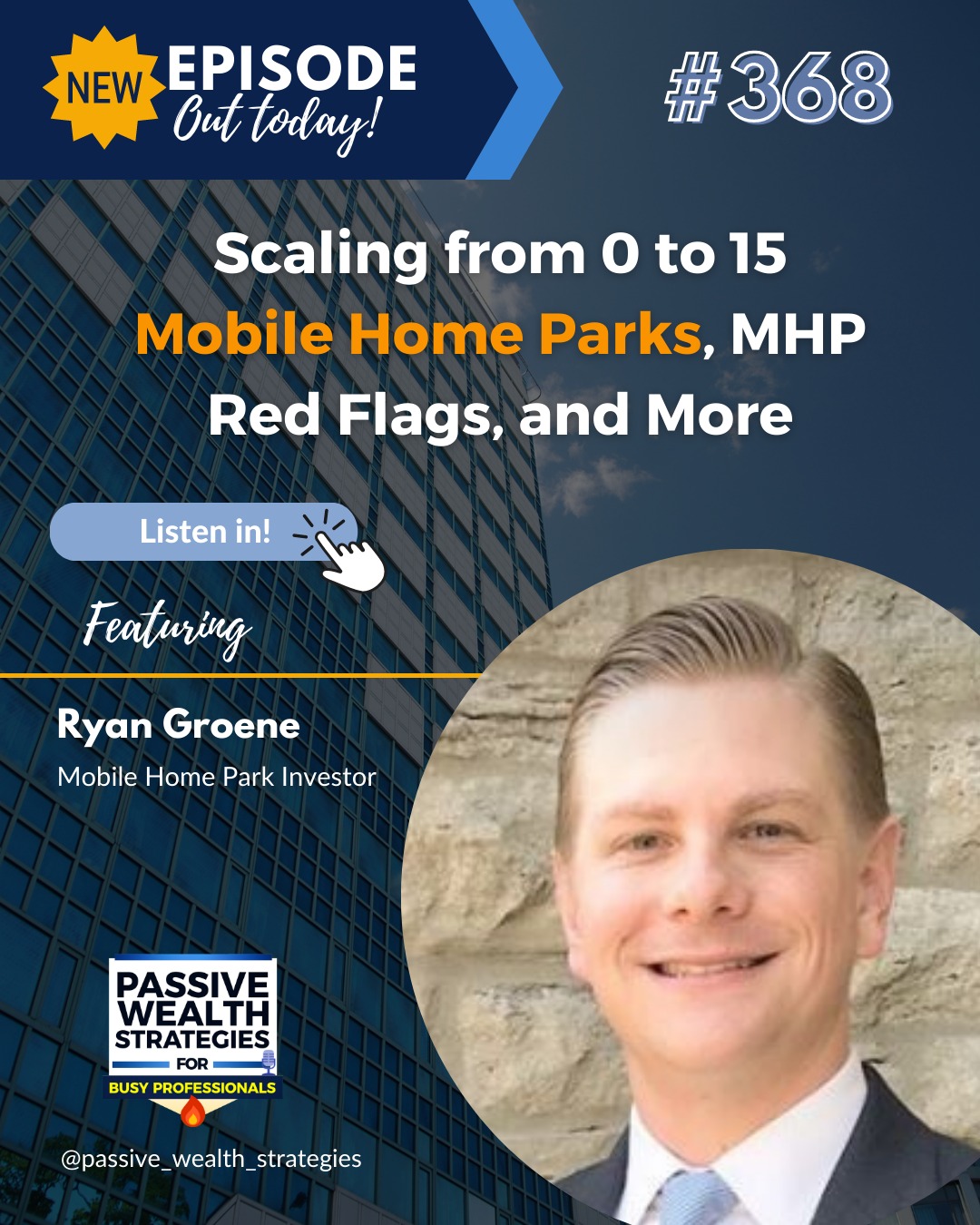
Scaling from 0 to 15 Mobile Home Parks, MHP Red Flags, and More with Ryan Groene
So when it was, that was my first experience and I’m like, oh, I don’t know if I want to buy these anymore. So anyways, get home, get over the initial allure of all the education and just sucking from a fire hose, essentially. I did my database. Did my mailers, did everything myself for a year or two.
I got a few deals under contract. At that time, so talking with people, I have some capital. And then I just, for whatever one reason or the other, I’d never ended up purchasing those parts that I had under contract. During that time I was going through the routine. I was, calling owners’ deals, looking at properties.
So I wasn’t just like sitting around it’s, it takes a lot of time and effort to. We go from zero to one. And then once you get past one, the ball starts rolling and it’s significantly easier because owners, being, I was 25 to 28 when I bought my first property owners didn’t necessarily take me as seriously.
And it’s okay to pivot, at least stay the course for six months to a year, not just a month and say, all right there are no deals. I’m not going to buy anything.
Yeah. And that’s that, I think that gets to that shiny object syndrome that a lot of people in real estate who are entrepreneurial may experience, I certainly did is you just get a distracted bounce from one thing to another, and don’t spend enough time focusing and frankly, failing and falling on your face often enough.
Yeah, we, I have it to this day. Hacker, that’s why we bought an RV park and self-storage facilities. I wouldn’t call it a shiny object there. We’ve reached a, not a plateau in our business, but we’ve reached where deals are a little bit harder than what they were still available, but they’re just different these days.
So we’re chasing yield and other asset classes because I like the other asset classes too, but I, number one is mobile. That’s what I do. They are out And the reason being is number one, they’re not building any more of them. So you have a limited supply, but huge demand for affordable housing.
Other than obviously the cash flow for every dollar we bring in revenue, we typically spend 30 to 40% of that. So the profit margins are relatively high. And then you have a sticky tenant base, meaning the residents that are there were nonsubsidized housing, Nicky, meaning a mobile home is not as mobile as what.
They typically cost anywhere from five to $10,000 to move. And most of our residents do not have that in the bank or affordable housing we’re in good locations and are safe, clean, affordable housing in America. It is what it is. And it’s the. Not last stop shop for people, but a lot of our people are either maybe had a hiccup in their own life or a previous life they’re retired and now they’re on a fixed income.
Or they just work, they’re starting and they have a family and they may work a lower wage job. Most of our residents make between 20 and $30,000 a year. Some make more and choose to live in a mobile home park and some make less. And the fourth is the taxes on it.
We have different depreciation schedules. You can do some costs side stuff with mobile home parks that apartments don’t have. That’s honestly some of the top reasons why I like mobile home parks and still like them to this day. But number one is the moat feature, right? That Warren Buffet talks about.
It’s an insulated asset class. You’re not building any more of them. And it’s a great asset class to be at this time. And through COVID. We had our struggles, but we got money eventually from the residents. But it’s been a good asset class to own and ensure investment. Meaning when the economy, when economies are bad is when economy is bad in the United States, mobile home parks tend to do a little bit better because the people are that just are above the fringe line, income-wise, they then may have something happen in their lives.
So they then have to come down to live in a mobile home park, which is not bad or good. It’s just that it’s more affordable. Our average lot rent is like, Sure on $50 across our portfolio, which is about the national average. So it’s really low, right? Where can you live? And maybe in a class, a location, where you can pay three to $400 and own your own home. It’s unheard of. And that’s why mobile home parks are an important feature in the housing crisis that we have in, in the United States right now, as far as affordability goes, because the average, I think two bedroom, three bedroom renters is over a thousand dollars in most markets.
I know my apartment in Charleston is over. The housing here is crazy. I think the medium housing price here, it’s close to four or 500,000. That’s a little bit about the asset class and why I like it. I continue to be bullish on absolutely.
Housing cycles since the great recession, but even over the last few years through the pandemic and everything like that, there’s been a lot of changes in the real estate market. And one of those changes is that mobile home park investing got a lot more popular at least, in this space.
And I’m sure, you notice that, and that may be impacting deal flow. What’s your experience been there, especially with. Since the beginning of COVID when people saw that, Hey, mobile home parks are still largely performing it and more money, basically ran into that space.
What you’re talking about is consolidation.
So it’s, it is a consolidation, meaning private equity groups larger institutional players, institutional, meaning they have 50 to a hundred million or more 10 best, right? Not just a few million, which is still a lot of money to invest in space, but I’m talking primarily above 25 to 50. In, in, in groups that are coming in and sweeping up large portfolios.
And when I started in 2015, I would mail out maybe a hundred letters. I’d probably get eight to 10 phone calls. So really good response rate with letters and people would be willing to sell at nine and 10, perhaps sometimes even higher. And I’m not joking. And I, I. Was too inexperienced to realize that the writing on the wall and then it started about 2017 to 2019 is where it got a little strange.
You had a lot more players starting to come in. They knew what was going on with barks and then, Sam Zell who with equity lifestyles, he’s been the number one mobile home park owner for a while. I think he might’ve been overtaken the year recently by the sun, but anyway, in the last 10 years, he’s been the number one.
He’s never sold a mobile. First, and he’s been buying since the seventies that tells you anything about the asset class on its own. He’s actually trying to buy more, but anyway, there’s been large groups that are coming in, and what it has done since interest rates have always been, have been are super low right now.
They’re going to go up, but They were compressed cap rates. So now you’re seeing deals that would have traded two years ago at a 67 cap. Now they’re trading at three to four and that’s just, and they’re locking in debt for two to 4%. So that’s what’s happening, right? And you have mid-midsize players like me where I have to return money to investors or even my own capital.
I don’t want to only earn a 3% return if I take cash for it. We’re earning, we’re putting debt on our assets, so we earn a little bit higher leverage. Returned, but let’s just assume I paid cash. I don’t want 3% of my money. I’d rather just hold it in the bank. And I know I lose money, but I just, I don’t want that return.
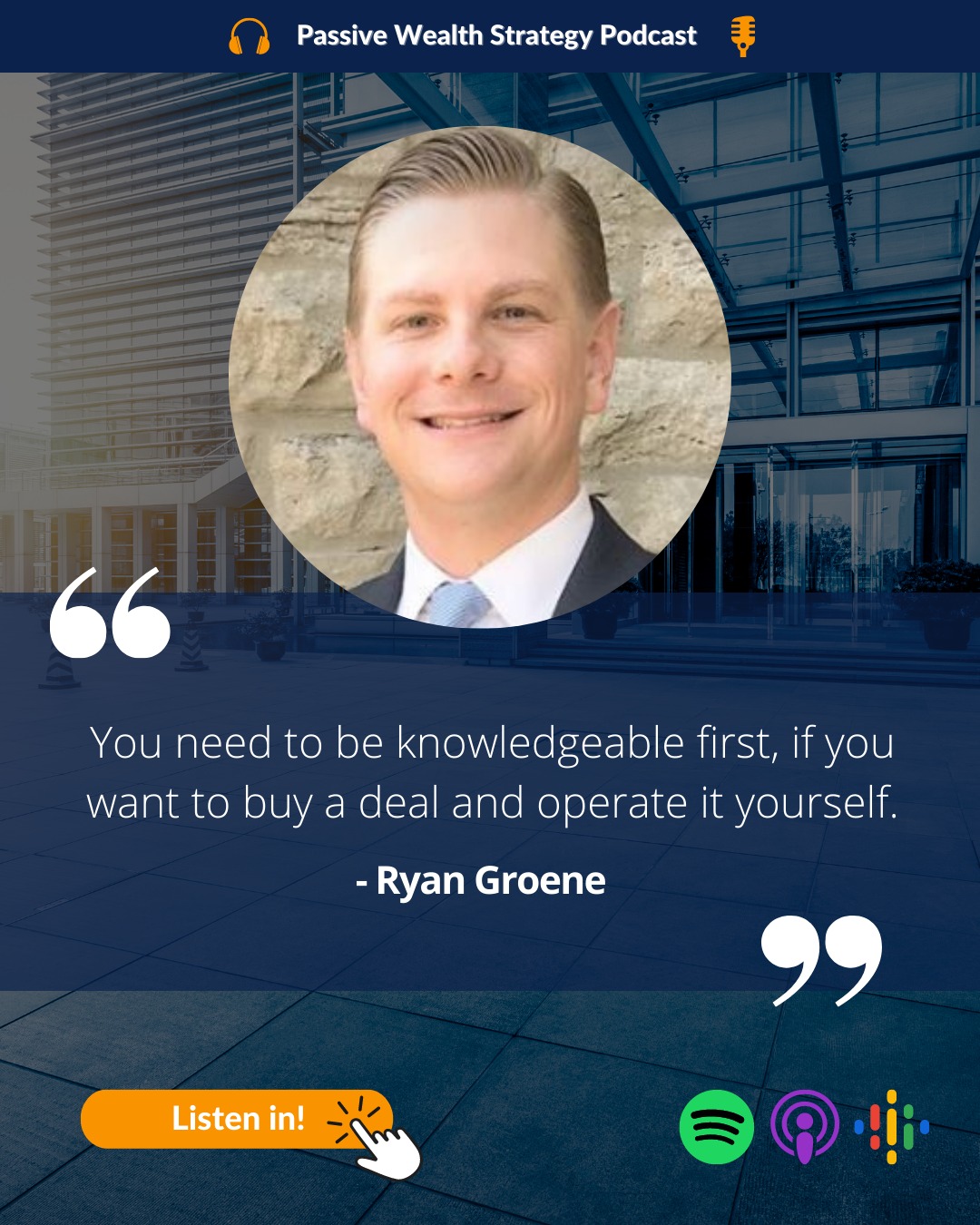
You need to be knowledgeable first, if you want to buy a deal and operate it yourself.
Ryan Groene Tweet
With that being said the space and there’s not, they’re not building any more of it. So you have this. It’s this massive problem. And a lot of guys are getting bought out. Their portfolios are getting sold. Blackstone is ma black at Blackstone or BlackRock. One of the two is making a massive run.
Their street name is. They actually merged with another top operator and they either bought out their portfolio. There’s been a, there’s been a bunch of traces, so we’ll continue to. And my me and myself I’ve been approached and we’ve sold parts, the larger operators that then go and sell their portfolio to another larger operators.
So then it becomes everything funnels to the top. And it leaves a lot of scattered deals across the United States. And there are a lot of just broken mobile home parks. So leaves opportunity for guys like me cause we’re value add investors, but it’s becoming harder and harder because there’s a lot more money flowing into the space and there’s a limiting supply.
So when you have that, it’s just, it creates lower returns and probably will stay like that. I, even if interest rates go up, I don’t think parks are going to the cap. Rates are gonna go up with them. I think they’re going to stay flat for a while. Now. Apartments may go up, but parks, I think, are still going to stay where they are.
Even if rates go up. And that’s just being that it’s a type of coupon type investment, meaning it’s pretty safe relative to other assets.
So in that vein, there are more players in the space. There are more people investing and yields are, compressed. I think that leads to passive investors wondering, okay, there are more players.
That probably means there are more inexperienced players in this space doing bad deals, maybe only winning because they’re frankly overpaying or they’re not seeing a particular. The aspect that’s wrong with the deal. So they pay too much, they don’t do the right due to diligence. And so that leads me to want to ask you, for the folks out there that are looking at passively investing in deals, what are some, deal killers that come to mind or, red flags or anything along those lines that people should look out for?
In the deal specifically or for the operator?
I would say I would leave it, certainly leave it open to both because you can, you don’t have a deal without an operator.
Number one, let’s start with the operator. If they’re promising you that they’re buying at four and five caps and they’re promising a 20% IRR or 20% cash on cash that’s and their debt is three to 4%.
I can say that. I’m not saying that they can’t hit that, but I’m saying with those numbers, it’s really hard to do a, even if it’s a stabilized deal, now, if it’s a value add or some major turnaround, you’re going to hit that on the refiner like that. But if they’re saying it’s a light value add, we’re just going to raise rents and bill backwater, and we’re going to hit 20.
That’s not how numbers work because what they’re doing is they’re modeling for an exit or refinance at a lower cap rate than what. So it creates a massive back exit. And typically you want to shy away from that because you don’t know what the future holds. So a lot of times if they’re, it could be that, but I wouldn’t necessarily bank on that also inexperienced in the space, but maybe they quickly grew.
So you want to vet their team a little bit more. And if they don’t have proven operators within their team, cause you can have, an ICO and a CEO and CFO, you can raise a bunch of money and go buy a bunch of deals. But if you don’t have the boots on the ground and the actual operational team, because mobile home parks are unlike other asset classes, you cannot hire out property managers and third-party property managers, unless they own the third-party property management.
It typically doesn’t work out in the favor of the operator and it’s very hard to scale effectively with mobile home parks. We’ll keep that in mind, but one home park or different asset class, we typically don’t own on the home. So we only own the lands but does create a little bit of some efficiencies you can get, but it’s harder to scale effectively because you can’t outsource management.
So you need a lot of personnel on your team, boots on the ground and in the backhaul. Number two with the deals themselves, private utilities, and aging infrastructure. So if you have a lot of these parts were built in the sixties and seventies, and even some of the eighties were nearing the useful life that they have strong infrastructure, meaning water, sewer lines streets everything, water and sewer lines are your biggest and constantly expense in a mobile home park, because typically you own that.
Even on private utilities on water and septic, or like a wastewater treatment plant. Those are 50 plus years old and you’re going to have to replace them. And if you can’t replace them, you’re basically buying a park. That’s going to die and you’re going to have to scrape it. You’re you, if your septic systems, for example, cannot connect to the city sewer, or you cannot replace the septics because you don’t have enough.
To replace the septic system or you don’t do proper due diligence and understand what the useful life of this is. If you don’t know what you’re getting into. You could have a massive capital expenditure in a year or two years. You’ve got to understand your infrastructure and then also do a phase one, like an environmental study.
It is definitely important to do that. Because you don’t know what the past performance of the land is. And you want to guarantee that you’re not buying like some type of EPA super fund where it used to be like a nuclear plant or a dry cleaner or something else. Because you’d be surprised.
What was done even 30, 40 years ago, there were no real regulations. A lot of these townspeople would just dump stuff into the earth until the eighties, I think that’s when it all changed, but ha where I used to live in Cleveland, Ohio, the river caught on fire because there were dumping so many pollutants in the seventies.
And yeah, so you don’t know what you’re buying, so you want to do proper due diligence. You want to know the market. You also want to understand Just because you’re buying a mobile home park location is still important. That’s the number one thing you still want to be in? Good school districts.
And if you’re in the hood, a mobile home parks is going to be the worst than those apartments, because that’s just from Mike.
So interesting. So quite a big list there. I’ve heard, you mentioned utilities in particular. I’ve heard folks talk about wastewater treatment. Plants are like lagoons being a big, problem, which, I’m not really sure what exactly that is, but it doesn’t paint a pretty picture.
Yeah. It’s a big lake and then it filters out all the cesspools and then you actually have to clean all the human waste and byproducts, like toilet paper. And. It’s a city sewer that is basically on your property. Just think of it that way. So yeah it’s expensive and it’s also, those can be infrastructure is the number one deal killer typically because you can fix, you can’t add location but you can typically fix infrastructure.
You can fix tenants, but you can’t fix locations. So if you buy in a bad location, I would say that’s the number one dealer, killer, everything else to be.
So before we hit record, you were telling me about a property that you guys recently to acquire acquired, not too far from me here in Virginia.
And we were talking about a different potential exit strategy with that particular deal. And that deal is closed from my understanding. So we could probably talk about it here, but I wanted to dig into that because I hadn’t heard of that exact strategy before, but it makes a lot of sense. So can you tell us?
So that’s not typical, so what Taylor’s referencing is I mentioned a covered land, so that’s what you’re specifically talking about, correct? Yeah. So basically with mobile home parks, because there’s a limited. And we’re buying in typically a and D class neighborhoods. So the land itself from an ax perspective from the government and just the overall usefulness of the land is typically better off being something else.
So it’s a covered land play because we have a potential exit strategy in the future. You sell to a developer or redevelop it ourselves, right? We could redevelop it into single-family houses, strip centers, into multi-family something that the actual land value would be worth more because it could be developed into something else.
That’s not always the case and the covered land plays because we’re collecting cash or getting cash flow through the asset. And then the exit could be, we sell it to another mobile home park operator. We refinance it or we sell it to a developer or we develop it ourselves. So that’s the covered land play piece.
And a lot of times these parks were built in areas where it wasn’t necessarily like. A lot of mobile home parks, you’ll see as a house and then you’ll see the mobile homes around it. And they were maybe like out in the country a little bit, but then the town grew that way. So now 50, 40 years later, it’s a class, a neighborhood, and everybody wants to live there.
An apartment building would make way more sense than a mobile home park because. From the city’s perspective, they get more taxes. They also get higher-income people that live in apartments, assuming it’s not affordable housing. And they get a little bit more fluent type of person in their eyes.
Therefore they can tax more and they can collect more money from the government side versus a mobile home park, which honestly doesn’t drive a lot of taxes for. For the city and they, a lot of times the residents, you use a lot of the free stuff out there that taxpayers pay for. So they see it as a drain on the city of themselves.
And let’s be honest. Nobody likes having a mobile home park in their backyard and that’s why it’s not my backyard type of stuff. So they’re trying to shut us down all the time. It’s always a battle. I have that going on right now to deal with the city, which wants to get rid of us. And we’ve won them over a little bit with our plan.
The old owner was terrible through them. So it left an uphill battle. It’s always an uphill battle. Never whenever I go to a real estate man, I’m the mobile home park guy. So it’s all hot, great now. But two, three years ago, people were like, you’re buying one, and why? So it’s come full circle, but that’s just, it’s always an uphill battle.
When, back in the day, when the mobile home park guy was the crazy nut job, those things were much more cash machines than they are today because they were just considered less attractive. But this deal, in particular, I thought it was. Before we got on the call, I looked it up on the map and I saw that it’s almost surrounded by new developed, I guess you’ve probably townhouses, but new developments, new properties.
And I can see a potential future where everybody that bought one of those houses is going to be calling their municipality saying, get rid of this thing. They’re going to be going, just complaining about it. And nimbyism I’m not a big fan, but. It’s going to, it’s here to stay.
And then people are probably going to push for that to be redeveloped. So that has an interesting potential exit.
We already have had not necessarily talks, but even the lender was like, yeah, this land is probably gonna be redeveloped. Fraser said the same thing. Multiple parties had said that, so that’s why we were like, We’re okay.
Paying the price that we did because it wasn’t typical we know there’s upside there and we’re going to get the cash flow, but the land is more than likely going to be worth more than that. The actual asset itself and where I live in Charleston, it’s like that too. A lot of assets are getting turned over and redeveloped because the land is worth more to other parties than what the current use of it is.
And it’s important to understand that when you’re buying real estate, I always what’s the exit strategy. What’s the worst-case scenario. That’s how I look at parks. And I look at investments. What is the exit strategy? Number one, if there’s not an out, I don’t want to buy it right. If I don’t have a feasible out, I don’t know.
Even when I’m looking at the mobile home park because or in other asset classes, that’s typically how we look at these. And a lot of times the covered land play helps. So I personally love this asset classmate. I hope it grows more and I hope we are allowed to develop some parks because I think there’s a real need for them.
It’s just a lot of the times the nimbyism like you said, we don’t get approval and we’re always facing an uphill battle.
Absolutely. So many of these places, so many people think they want affordable housing, but then, you see just constant opposition to new development or actually affordable housing left and right.
In some, local neighborhood groups and people are complaining about the cost of housing, but also. Openly opposing any new high-density developments in our area, you cannot have both its basic supply and demand. We need more housing for anything to be. Exactly. Yeah. Great. Right now we’re going to take a quick break for our sponsor.
All right, Ryan, I’ve got three questions. I ask every guest on the show. Are you ready?
I think so. Yeah, I’m ready.
Great. First one. What is the best investment you ever made other than in your education?
Believe it or not. In my first Milan park, I emptied my, taking the risk to I emptied my 401k which is a total massive move against society.
Nobody, like a lot of people, looked at me like I’m crazy and whatever. But the tax is paid 50% of it, whatever is invested in a mobile home park. And we sold that park last year and. Six times our money. So that was my best investment to date. Typically I try to double my money, but that was my best investment today and could be into the future.
Not sure. Nice. We had the best investment. Now I go to the other side of that coin, the worst investment. What is the worst investment you ever made?
I would say it doesn’t necessarily have to do with the asset itself. It was getting into. Being super hungry to be successful and maybe not vetting the partner’s interest long-term and being in the wrong partnership from the general partnership side and buying a few mobile home parks together while I have not to date, knock on wood, lost money on an investment.
So it’s hard to say what’s my worst investment. We’ve not made as much as what we’ve maybe had anticipated, but it would be for me the partnership thing. And if I don’t get along with somebody initially, I may give it a second chance. But if our interests aren’t aligned, even if we’re total opposites, we make good partners.
It’s got to fit naturally. And it’s actually can be worse than getting a divorce. Like honestly it can make you feel. Worse, because if you think about the time that you work most people work eight to five, nine to six. That’s way more than what you’re spending potentially with your significant other because you’re only really with your significant other in the evenings and on the weekends.
And it’s you may live with them, but work and money are way different people take that way differently than, personal relationship. So I would say partnership, that was my worst. But it just, nothing at towards the person. It just didn’t align.
That’s wisdom. And a lot of times that wisdom only really comes from personal firsthand experience.
So I appreciate that. My favorite question here at the end of the show is what is the most important lesson you’ve learned in business and investing, That you need to believe in yourself and you have to be educated.
That is, if you’re not knowledgeable on a subject and you’re going to plan to be a general partner or go buy your deal yourself and then operate it, you have to be educated at least.
Minimally read one book or listen to a podcast and obviously, I’d say do more than that, but that would be my number one thing, get educated and then also be confident in your abilities and know your abilities. Like I’m good at typically I’m good. Good at networking. Talk with people I enjoy doing that.
I help, I like how I like helping others and educating others. So like reaching out to guys like me that have been there and done that And then just being confident in yourself and the ability to take risks, because if you’re not confident it’s gonna or even somewhat sure it’s going to relay to other investors.
And basically, it’s going to make them cautious and they’re not going to want to maybe partner with you. And the first deal is always the hardest. So maybe you go buy it on your own and you get a proven track record. I didn’t have that luxury. But being confident, being educated. The most important lesson other than, trying to buy good deals, but, that’s just an inherent thing with investing, you’re always looking to do a budget, good deal. But It’s more on the personal side, like personal development. That is probably the most important thing. And it is for sure.
Nice. Ryan, thank you so much for joining us today and sharing all of these lessons with us. If folks want to reach out, if they want to get in touch with you, if they want to learn more, or anything like that, where can they track it?
You can find me on Facebook, Instagram, LinkedIn, just my name Ryan Groene and you can message me there or follow me or whatever have you, and reach out to me via those streams. And I’m happy to jump on the phone or trade emails with somebody. Potential investment or just answer questions on mobile home parks.
I know we didn’t go too in-depth here on the actual operations of parks, which is fine and we can save it for another show.
Awesome. Thank you once again for joining us today to everybody out there. Thank you for tuning in. If you’re enjoying the show, please leave us a rating and review on the apple podcast.
Five stars. If you don’t mind, guys, I appreciate it. So much that helps other people learn about the show because that helps us rank higher in the apple podcast ecosystem. And I’m always honest with you guys that gives me a nice little warm and fuzzy feeling because I get to see that you’re engaging with the content and you’re escaping the wall street casino along with us.
If you know anyone who could use a little bit more passive wealth in their lives, please share the show with them and bring them into the tribe when it thank you for tuning in once again, don’t forget to subscribe and catch us here every Monday, Tuesday, and Thursday. I hope you have a great rest of your day today, and we’ll talk to you on the next one.
Bye-bye.
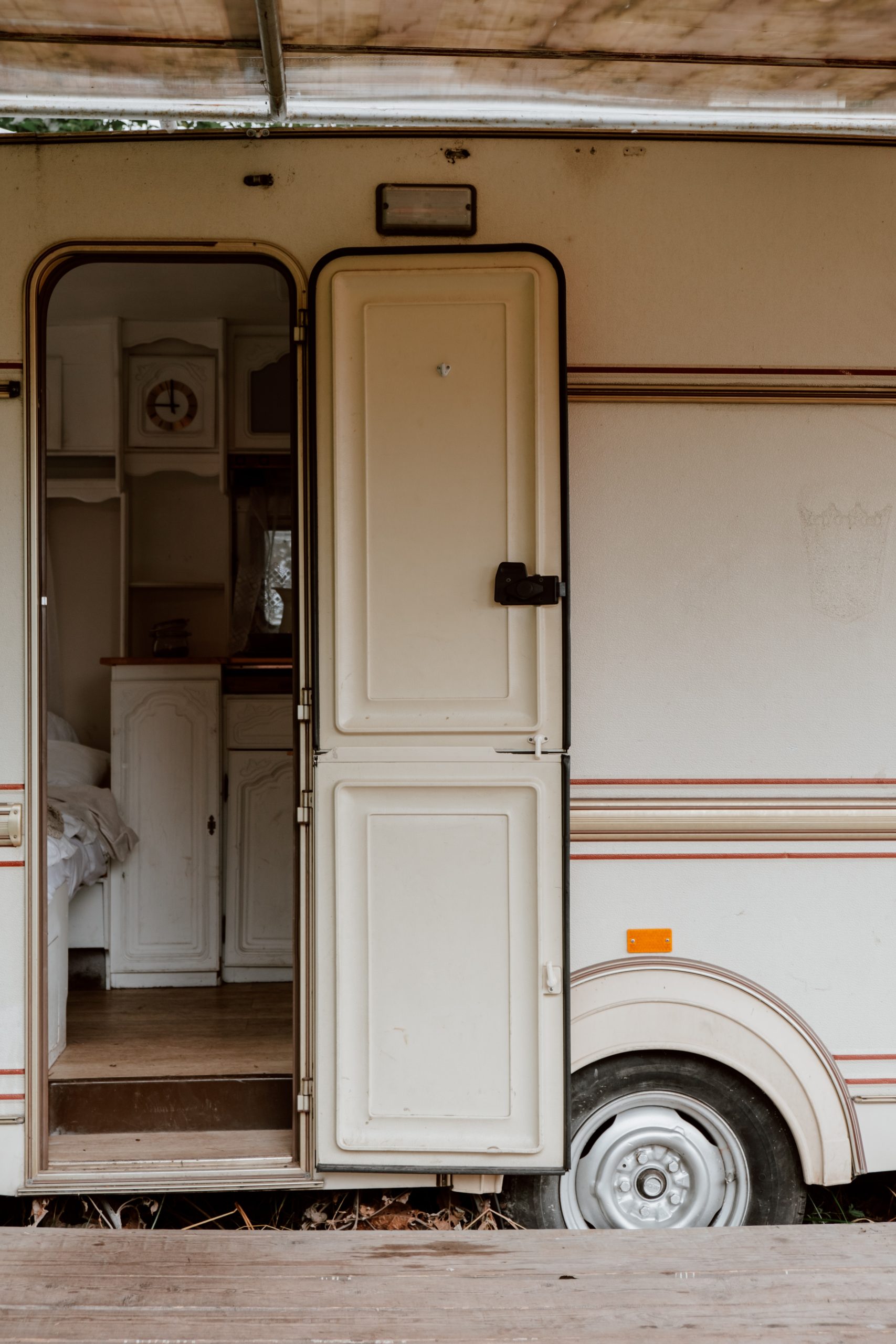
Scaling from 0 to 15 Mobile Home Parks, MHP Red Flags, and More
About our Guest
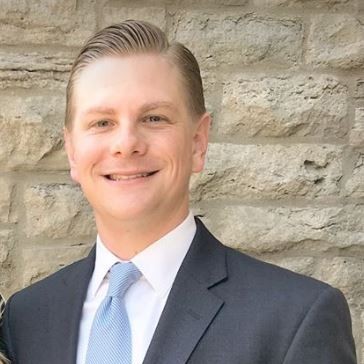
Ryan Groene
Ryan Groene graduated from The Farmer School of Business at Miami University (OH) in 2012 with a B.S. in Finance. During his academic career, Ryan played 4 years of collegiate baseball.
After graduation, he worked in the Finance industry prior to getting into the mobile home park industry full time. Currently, his portfolio has grown to over 7 parks, spreading across 300 lots across the Midwest and Southeast.
Ryan also serves as the Director of Operations for Buckeye Communities where he oversees the operations of over 400 lots spread across 5 parks in Ohio and Michigan. Ryan has been involved with over 1000 lots and almost every aspect of finding, running, turning around, and refinancing/selling mobile home communities.
Episode Show Notes
Ryan Groene graduated from The Farmer School of Business at Miami University (OH) in 2012 with a B.S. in Finance. During his academic career, Ryan played 4 years of collegiate baseball. After graduation, he worked in the Finance industry prior to getting into the mobile home park industry full time. Currently, his portfolio has grown to over 7 parks, spreading across 300 lots across the Midwest and Southeast. Ryan also serves as the Director of Operations for Buckeye Communities where he oversees the operations of over 400 lots spread across 5 parks in Ohio and Michigan. Ryan has been involved with over 1000 lots and almost every aspect of finding, running, turning around, and refinancing/selling mobile home communities.
[00:01 – 05:54] Opening Segment
Get to know Ryan Groene
Ryan shares his journey from his finance background to mobile home parks
[05:55 – 12:55] Scaling from 0 to 15 Mobile Home Parks
Why it took three years for Ryan to buy his first mobile home park
Focusing on a single asset class at a time
Ryan recalls a mobile house deal that was not so mobile
The Impact of Mobile Home Parks on America’s Housing Crisis
[12:56 – 27:05] Mobile Home Park Red Flags, and More
Ryan talks about the increasing mobile home park trend
Red flags to look out for while passively investing in MHPs
Choosing the best location for your MHP
Ryan’s strategy for his covered land deal
Why you should always have an exit strategy
[27:06 – 36:15] Closing Segment
Quick break for our sponsors
The first step to growing your wealth is tracking your wealth, income spending and everything else about your finances, you can start tracking your wealth for free and get six free months of wealth advisor. Learn more about Personal Capital at www.escapingwallstreet.com
What is the best investment you’ve ever made other than your education?
His first mobile home park
Ryan’s worst investment
Being in the wrong partnership
What is the most important lesson that you’ve learned in business and investing?
“Believe in yourself and be educated.”
Connect with Ryan Groene through Facebook, Instagram, and LinkedIn.
Invest passively in multiple commercial real estate assets such as apartments, self storage, medical facilities, hotels and more through https://www.passivewealthstrategy.com/crowdstreet/
Participate directly in real estate investment loans on a fractional basis. Go to www.passivewealthstrategy.com/groundfloor/ and get ready to invest on your own terms.
Join our Passive Investor Club for access to passive commercial real estate investment opportunities.
LEAVE A REVIEW + help someone who wants to explode their business growth by sharing this episode or click here to listen to our previous episodes
Resources Mentioned:
Tweetable Quotes:
“It takes a lot of time and effort to go from zero to one. And then once you get past one, the ball starts rolling in, it’s significantly easier.” – Ryan Groene
“When the economy is bad in the United States, mobile home parks have to do a little bit better.” – Ryan Groene
“It’s important to understand that when you’re buying real estate, you always have to think about the exit strategy.” – Ryan Groene







